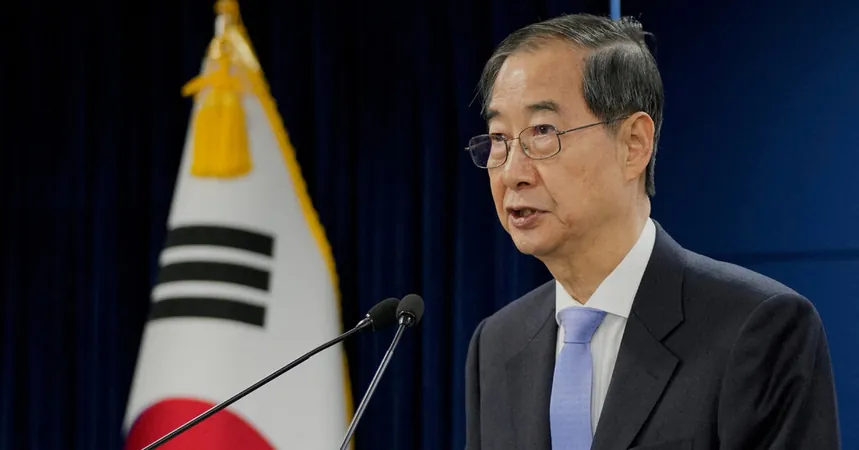
South Korea’s Crisis Deepens as Constitutional Court Reinstates Impeached Prime Minister Han Duck-soo
2025-03-24
Author: Jia
In a dramatic twist to South Korea's political saga, Prime Minister Han Duck-soo has been reinstated to his position as acting president after the nation’s Constitutional Court overturned his impeachment. This decision, announced on Monday, has not provided the stability many had hoped for, amid ongoing political chaos in a country grappling with major crises.
Han Duck-soo's tumultuous journey began when he was briefly appointed as South Korea's acting president after the National Assembly impeached President Yoon Suk Yeol on December 14, 2022, relating to Yoon's contentious attempt to impose martial law. However, before Han could solidify his role, he was also impeached less than two weeks later, reflecting the deep divisions within South Korean politics and the growing instability faced by this key U.S. ally in Asia.
The Constitutional Court's ruling did not address President Yoon's lingering fate, which continues to loom over the South Korean political landscape. Citizens remain anxious as they await the court's crucial decision on whether Yoon will be ousted or reinstated. Should he be removed, a new president must be elected within 60 days, potentially plunging South Korea into further turmoil. Conversely, if Yoon is reinstated, he will lead a divided nation amidst escalating tensions, not only with North Korea, whose nuclear threats remain a constant concern, but also in light of incoming global tariffs that could reshape economic landscapes.
The Constitutional Court plays a pivotal role, having the ultimate authority on the removal or reinstatement of impeached officials. Its ruling on Han's impeachment was conclusive and cannot be challenged. As Han resumes his duties, he replaces Finance Minister Choi Sang-mok, who had been acting as president during the power vacuum, underscoring the government’s instability at a critical juncture.
The impeachment of Han stemmed from accusations of collaborating in President Yoon's controversial declaration of martial law and failing to appoint three justices nominated by the Assembly—a significant move that critics argue was a political maneuver to strengthen Yoon's chances of reinstatement. Ultimately, the court found that while Han’s actions regarding the justices were unconstitutional, they did not warrant removal. Notably, only one of the eight justices supported Han's ousting.
When President Yoon was impeached, the Constitutional Court was down to six justices due to vacancies, leading to suspicions that Han’s refusal to appoint nominees was a tactical effort to protect Yoon’s position. However, Choi, who succeeded Han, managed to fill two of those vacancies, leaving only one position unfilled in the nine-member court.
Upon his return to office after 88 tumultuous days, Han expressed gratitude to the Constitutional Court for its decision and emphasized the need for South Korea to overcome its political fragmentation. He called for a united front to navigate the “intensifying hegemonic competition” between the United States and China, especially in light of geopolitical uncertainties following Donald Trump's inauguration.
As South Korea faces a pivotal moment in its political history, the question remains: can the nation overcome its divides and ensure stable governance amidst external threats and internal discord? The coming weeks will be crucial not just for the future of its leadership, but for its role on the world stage.


 Brasil (PT)
Brasil (PT)
 Canada (EN)
Canada (EN)
 Chile (ES)
Chile (ES)
 Česko (CS)
Česko (CS)
 대한민국 (KO)
대한민국 (KO)
 España (ES)
España (ES)
 France (FR)
France (FR)
 Hong Kong (EN)
Hong Kong (EN)
 Italia (IT)
Italia (IT)
 日本 (JA)
日本 (JA)
 Magyarország (HU)
Magyarország (HU)
 Norge (NO)
Norge (NO)
 Polska (PL)
Polska (PL)
 Schweiz (DE)
Schweiz (DE)
 Singapore (EN)
Singapore (EN)
 Sverige (SV)
Sverige (SV)
 Suomi (FI)
Suomi (FI)
 Türkiye (TR)
Türkiye (TR)
 الإمارات العربية المتحدة (AR)
الإمارات العربية المتحدة (AR)